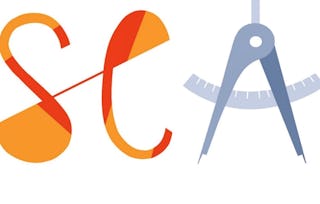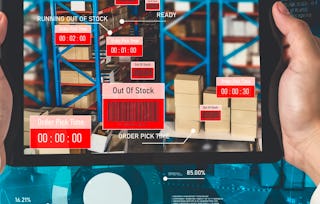In the Implementing Supply Chain Analytics: Descriptive, Diagnostic, Predictive and Prescriptive course, you’ll discover how implementing analytical methods, models, and tools helps decision-making become more efficient. You’ll use different types of methods, models, and tools, depending on specific business scenarios or needs, to help you analyze the current state of the supply chain and to lead you to insightful solutions. You’ll also explore the utilization of supply chain models to evaluate and question the data to optimize the flow of goods, information, and cost in a supply chain to help identify potential improvements, determine the most efficient or practical course of action, and to communicate the impact to the customer.

Implementing Supply Chain Analytics

Implementing Supply Chain Analytics
This course is part of Unilever Supply Chain Data Analyst Professional Certificate

Instructor: Unilever Team
Access provided by Coursera for Reliance Family
7,107 already enrolled
64 reviews
Recommended experience
Skills you'll gain
- Data Analysis
- SQL
- Forecasting
- Supply Chain Systems
- Analytics
- Transportation, Supply Chain, and Logistics
- Supply Chain Management
- Data Presentation
- Inventory Management System
- Agile Methodology
- Descriptive Analytics
- Data-Driven Decision-Making
- Python Programming
- Predictive Analytics
- Business Analytics
- Advanced Analytics
- Supply Chain Planning
- Technical Communication
- Skills section collapsed. Showing 9 of 18 skills.
Details to know

Add to your LinkedIn profile
19 assignments
See how employees at top companies are mastering in-demand skills

Build your Data Analysis expertise
- Learn new concepts from industry experts
- Gain a foundational understanding of a subject or tool
- Develop job-relevant skills with hands-on projects
- Earn a shareable career certificate from Unilever

There are 4 modules in this course
In this module, you will learn how programming languages such as Python and SQL assist in managing, cleaning, summarizing and manipulating data.Communicating Diagnostic Analytics You will also learn how to use programming languages to create meaningful data visualizations.
What's included
16 videos6 readings3 assignments1 discussion prompt
Data analytics is the practice of examining data to answer questions, identify trends, and extract insights. In this module, you will focus on the four levels of data anlytics that help answer questions about what happened and why, what might happen in the future, and what are the possible outcomes.
What's included
15 videos11 readings6 assignments1 discussion prompt
There are several different types of Supply Chain models. Once you know the probem your trying to solve, you can select the type of model that will best help you find a solution. In this module you will learn how use the inventory model to describe inventory policies, inputs and outputs, operations related to inventory management, how to use the continuous flow model to describe the current state and current practices in the business operations to identify opportunities for improvement, and how to use the fast chain model to describe the current state and current practices in the business operations to identify opportunities for improvement.
What's included
11 videos5 readings4 assignments
There are several different types of Supply Chain models. Once you know the probem your trying to solve, you can select the type of model that will best help you find a solution. In this module you will learn how use the efficient chain model to identify optimal scenarios and best practices that could be translated into other environments, use the agile model to prepare for participating in cross-functional developments driven by the supply chain, use the custom-configured model to prepare cross-functional developments driven by the supply chain with a more flexible infrastructure to new projects or developments, and use the flexible model to build flexible structures and scenario planning.
What's included
7 videos22 readings6 assignments
Earn a career certificate
Add this credential to your LinkedIn profile, resume, or CV. Share it on social media and in your performance review.
Instructor

Offered by
Why people choose Coursera for their career

Felipe M.

Jennifer J.

Larry W.

Chaitanya A.
Learner reviews
- 5 stars
78.12%
- 4 stars
14.06%
- 3 stars
3.12%
- 2 stars
3.12%
- 1 star
1.56%
Showing 3 of 64
Reviewed on Nov 25, 2025
its was good but can also add more pratical questions
Reviewed on Jul 22, 2024
This was also really informative, it has led me to want to go more into learning Python and SQL, this course was a real good introduction and quite good in how it was curated.
Explore more from Data Science

Rutgers the State University of New Jersey

Rutgers the State University of New Jersey



